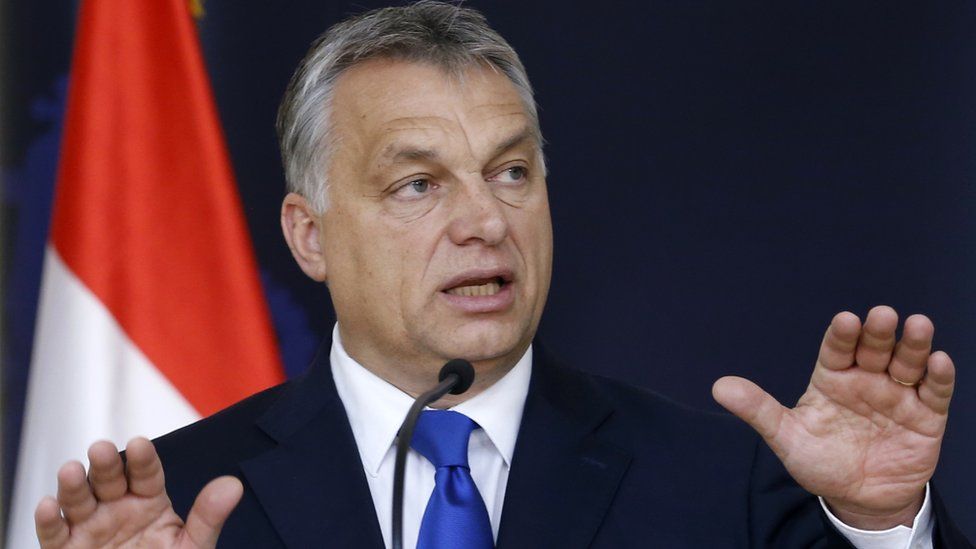Hungarian attack on George Soros prompts NGO anger
- Published

Hungary's right-wing Fidesz government has been accused of undermining basic democratic norms and harking back to the country's totalitarian past for launching an offensive against non-government organisations.
At the centre of the furore is 86 year-old Hungarian-born philanthropist George Soros.
His Open Society Foundations (OSF) are active in 100 countries, and have supported civil groups in Eastern Europe and the Balkans since the mid-1980s. When they were in opposition, leading Fidesz figures were themselves beneficiaries of the OSF.
Fidesz officials and pro-government media accuse the NGOs of representing an unelected, meddling, liberal elite whose time has gone.
Soros-funded groups now stand accused of organising anti-government protests in Poland, and of using anti-corruption campaigns in Romania, Slovakia, the Czech Republic and Hungary to undermine elected officials.
Mr Soros was himself targeted by US President-elect Donald Trump in a campaign ad last year, which was criticised for repeating anti-Semitic tropes about Jews and "global special interests".
"First, the government weakened democratic institutions like the Constitutional Court and the office of the Ombudsman," said Andras Kadar, co-chairman of one NGO, the Hungarian Helsinki Committee.
"Then they decimated the press," he complained, in a reference to the government takeover of public service media and the buyout or closure of critical voices such as the main opposition daily Nepszabadsag last October.
"Now they're declaring war on those watchdog NGOs which have the capacity to investigate and expose the abuse of power." Three have been named: Transparency International, the Hungarian Civil Liberties Union, and the Helsinki Committee.
More stories from Hungary
That is not how leading Fidesz officials see it. Donald Trump's election victory in the US has created an "international opportunity to sweep away" the troublesome organisations, according to Fidesz's deputy leader in parliament Szilard Nemeth.
And Prime Minister Viktor Orban agrees. This will be the year, he told online tabloid 888.hu in December, when such NGOs are squeezed out all over Europe. "Where the money came from, which secret services they were connected to, and which NGOs serve which interests, all will be uncovered," he declared.
Mr Orban's "spring offensive" will start with an amendment to a 2011 law, to require NGO leaders to declare their assets. This appears to be modelled on recent Russian and Israeli regulations to restrict civil society.
In a statement, OSF President Christopher Stone said the organisation's past work in Hungary had included awarding 3,000 scholarships to Hungarian students - who included Mr Orban himself.
"The Open Society Foundations will continue to work in Hungary despite government opposition to our mission of fairer, accountable societies," he said.
"In Hungary and around the world we are more focused than ever on working with local groups to strengthen democratic practice, rights, and justice."
Last year, the OSF was banished from Russia after a three-stage process that began with financial investigations, and then saw it labelled as a "foreign agent", which finally made it impossible to function.
And Hungary now needs to act too, says Fidesz's Szilard Nemeth. "The Soros empire's pseudo-civil organisations are funded to push global big business and the world of political correctness by going over the head of national governments. These organisations must be driven back by all possible means."
- Published11 October 2016